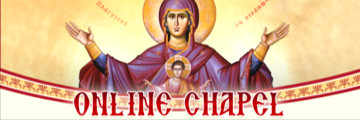 Abba Nilus said, “Do not be always wanting everything to turn out as you think it should, but rather as God pleases, then you will be undisturbed and thankful in your prayer.”[1]
Abba Nilus said, “Do not be always wanting everything to turn out as you think it should, but rather as God pleases, then you will be undisturbed and thankful in your prayer.”[1]
“Undisturbed and thankful” is something we usually associate with enjoying the blessings of life–good food, good reputation, financial resources, health and the successful pursuit of happiness in the world. But this isn’t the kind of blessing that the Abba points to.
In the concentration camps, when their hair was shaved off and they were stripped of their clothing, food, privileges and other worldly blessings, those who were attached to these kinds of blessings often succumbed to despair and died. They served the same passions Job’s wife did in her misery when she complained to Job: “Are you still protesting your righteousness? Curse God and die.” [2]
Among the hardest lessons to learn in life is that my will is not God’s will and my human presumption of righteousness is maintained only without having reference to God’s. ‘Thy will be done on earth as it is in heaven” reveals a different path; one that involves lifelong repentance, prayer and conscious struggle based on faith in Christ.
Things that happen to us against our will involve involuntary suffering. But we have a choice that determines the effect it has on us, which is part of our formation in the likeness of God. The Lord explains, “see, I set before you this day, life and death, blessing and curse, therefore choose life so that you and your descendants may live.”[3] Involuntary suffering comes upon us both from natural events outside our control, both within us and outside us, and also from the effects of our past sins and the sins of others against us.
These involuntary sufferings are quite valuable to us, insofar as they are an opportunity to go deeper into the mystery of the Cross which is planted at the intersection between human justice and divine love and mercy; between self-love and temporary worldly satisfactions and the peace that comes, “not as the world gives” but from Christ who has conquered the world by his free embrace of involuntary suffering. In the midst of all the injustice and unfairness unleashed against Him as the events of His Passion unfolded, he showed us the path that leads to life. “No one takes my life away from me, I give it.”[4]
Voluntary suffering brings worldly rewards. Athletic prowess, physical fitness, vital health, academic degrees, scientific accomplishments, artistic endeavors, etc. are all good things that are achieved by dedicated and persistent efforts, even when painful. “No pain, no gain.” They are all the natural result of willful efforts to achieve them, albeit even though the capacity, willingness and opportunities to do this are all gifts of God we often fail to acknowledge.
Involuntary suffering is different. It offers an opportunity to discover a peace that is deeper than worldly satisfaction and human achievement. When disasters strike without warning, sicknesses, pain and suffering invade our lives, ill-will and slander assail us, betrayals threaten us seemingly without our being at fault, the temptations presented by seeking to avoid the involuntary suffering, are of two kinds.
In our protest against the injustice, we may become crusaders unknowingly fueled by passions of pride, self-righteousness, angry resentment and even vindictiveness, slowly becoming servants of the very evils that we are seeking to condemn and correct in others. One dog cannot stop another dog from barking by barking louder.
At the other extreme, we can slide into passivity and resignation with the justification of our response being “spiritual.” An above-it-all kind of vainglory is revealed by the psychic numbing covering over the despondency, self-pity and peevish sense of unfairness which continue to lurk behind an outward display of religious piety.
Humility, joy, love, gratefulness and patience are signs of true faith and hope in Christ and they are never paraded about as something to get credit for. Suffice to say that apart from relationship with Christ, a host of passions will assail us in our suffering, multiplying like swarming bacteria, as we secretly try to have our own way and justify ourselves in the face of involuntary suffering rather than enter the way of the Cross He sets before us as the path to resurrection.
Involuntary suffering is approached realistically by doing what we can in reasonable ways to eliminate any unnecessary suffering we can and working to rectify human injustices through appropriate channels of political and interpersonal life. When we get sick, we go to the doctor. If the roof of our house caves in we rebuild it. Jesus counseled, while being gentle as doves, to realize there are wolves about and to be shrewd as serpents. He did the same. When they wanted to throw Jesus over a cliff, He avoided it. [5] When His brothers tried to push Him to do something prematurely that would have proved dangerous to him, He declined and approached the same situation”secretly.”[6] He intervened where there was cruelty and unfairness to people even when apparently justified by the law. [7] and He took steps to ease human suffering even when it was against the law. [8]
For “Thy will in heaven to be done on earth” Christians seek freedom from attachment to worldliness in order to sanctify the creation through offering it first to God before partaking in it. This includes our own lives as well. This is costly. After having done what we reasonably can existentially to correct injustice, we then embrace as “necessary suffering” the involuntary pain and obstacles we cannot change by human means alone. This ascetical forbearance becomes an opportunity for a deeper relationship and trust in God arising through repentance. In patience, we wait expectantly for an ontological transformation as we are drawn by Grace toward a “peace that passes human understanding” according to the mysterious loving providence of God.
The narrow way that leads beyond the slavery of worldly human satisfaction to the freely embraced gift of eternal life is the one that St. Nilus points the way too. It takes great patience and willingness to trust God’s love for us in all things and to willingly share the Cross of suffering while we continue to live with vigor, interest and joy.
Consciously choosing to receive involuntary suffering as a mercy of God, is an essential ingredient to the process by which pride and vainglorious trust in our own self-importance are slowly rooted out and we are ushered into the Way of love and mercy that is True and leads to Life eternal.
[1] Sayings of the Desert Fathers, p.154.
[2] Job. 2:9
[3] Deut. 30:19.
[4] Jn 10:18
[5] Lk 4:29
[6] Jn 7:10.
[7] Jn 8:7.
[8] Jn. 5:10; Lk 14:4.



